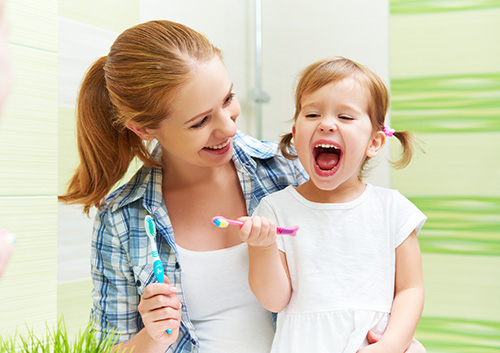
Your baby’s first smiles are precious—and you want to make sure those precious smiles are as healthy as they are beautiful. One of the most important ways to protect your child’s dental health is by preventing early childhood caries, or cavities.
You might be thinking, “Tooth decay? Babies?” Yes, babies and toddlers can get cavities, too. Studies suggest that over a quarter of children between the ages of two and five already have some form of tooth decay.
The bacteria that cause tooth decay are passed from person to person. Cavity-causing bacteria use the sugar and starches in our diets to produce acids—acids which attack the tooth’s enamel, breaking down its hard mineral structure until cavities form. Because baby teeth have thinner enamel coatings than adult teeth, they are especially vulnerable to tooth decay.
You can start your child on the path to a lifetime of healthy smiles by being proactive about cavity prevention during your baby’s first 12 months.
Because cavity-causing oral bacteria are transmitted from person to person, doctors and dentists suggest that you don’t share a spoon with your baby, or put a pacifier in your mouth to clean it. And it’s a good idea to rinse toys used by other children with clean water before giving them to your child.
Babies generally need a feeding before bedtime to ensure that they get all the nutrition their growing bodies need. But when a young child sleeps with a bottle, liquids pool in the mouth, exposing tiny teeth to these liquids throughout the night and preventing the natural flow of saliva from washing food particles away.
Bring your child’s happy day to a close with a lullaby, a bedtime story, a good night kiss, or whatever makes your baby feel comforted and loved—and take the bottle with you when you tiptoe out of the room.
How do parents make sure their babies get the nutrition they need without giving cavity-causing bacteria the fuel they need? With a healthy diet. Breast milk and formula have healthy nutrients, carbs, and sugars which are necessary for baby’s growth and development. Sugar water, sweet juices, and sodas—don’t.
Added sugars provide a feast for cavity-causing bacteria, and the more your child is exposed to them throughout the day, the greater the risk of tooth decay. Talk to Drs. Richee Berry, Bryce Miller, Jarrett Caldwell, Nicholas Gordon for the healthiest drinks for your baby’s bottle or sippy cup.
- Clean Baby’s Teeth and Gums
Dentists recommend cleaning your baby’s gums even before teeth begin to arrive. After washing your hands, using a clean, damp, soft cloth or gauze pad to gently wipe the gum surfaces to remove bacteria and food.
As soon as the first tooth appears, it’s time to start gentle brushing. Use a baby-sized toothbrush to gently clean the erupting teeth once in the morning and once after the last feeding of the day. And as soon as two baby teeth touch, it’s time to talk about flossing.
Not sure about baby-friendly tooth care products, toothpastes, and techniques? Talk to Drs. Richee Berry, Bryce Miller, Jarrett Caldwell, Nicholas Gordon! Learn about cleaning little gums, baby-size brushes, when to begin using fluoride toothpaste and how much toothpaste to use, when to brush, and when to start flossing.
- Establish a Dental Home for Your Child
The ideal time for your child’s first visit to our Bowie office is sometime between the appearance of your child’s first tooth and your child’s first birthday. It’s a gentle way to introduce your baby to the dental team who will be caring for those little smiles for many years to come.
During that first visit, your child’s dentist will check tooth and jaw development. There will be a child-friendly examination to look for plaque buildup or any signs of early decay, such as white spots on tooth enamel. You can talk about any concerns you might have and learn the best ways to prevent tooth decay with proactive dental care for healthy teeth and gums.
Why are we so concerned about baby teeth? Decayed teeth can cause pain and self-consciousness. And more, those tiny teeth have big responsibilities. Baby teeth influence your child’s speech development. They promote healthy eating and chewing habits. Baby teeth serve as placeholders to make sure that your child’s adult teeth will be able to erupt just where they should.
Your baby’s first smiles are precious. And when you’re proactive with early dental care, you’re preparing your child for a lifetime of healthy smiles.



